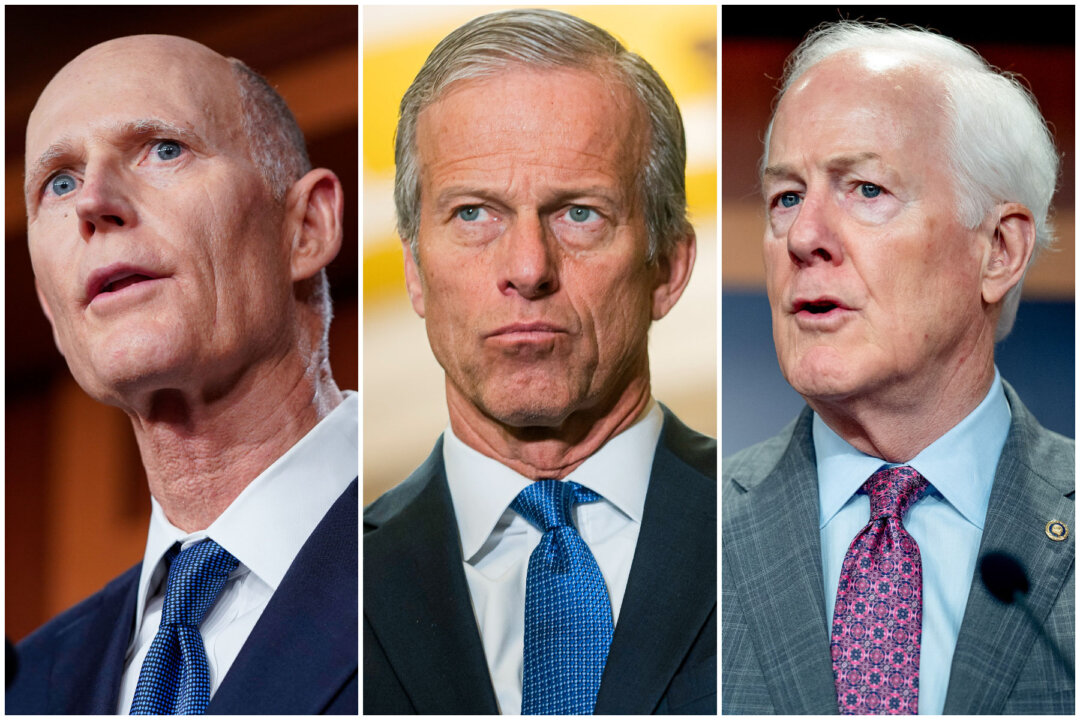
WASHINGTON—Washington pundits are portraying the contest for Senate majority leader as pitting two well-liked GOP establishment favorites—Sen. John Thune of South Dakota and Sen. John Cornyn of Texas—against Florida conservative Sen.
Rick Scott, a relative youngster in Congress, who is expected to rock the boat big-time. But that narrative breaks down when the lifetime legislative records of the three lawmakers are examined. There is little difference in how they vote on major issues, according to Conservative Political Action Committee (CPAC) ratings.
The CPAC report evaluates votes cast by all 535 members of Congress across the spectrum of policy issues. The three men are vying for the most powerful position in the upper chamber. The majority leader controls the Senate schedule, decides who chairs Senate committees and who serves on them, and oversees millions of dollars in campaign donations.
Republicans will control the Senate with a 53–47 majority in the 119th Congress that convenes on Jan. 3, 2025. Senate Democrats will choose the chamber’s minority leader, who will succeed Sen.
Chuck Schumer (D-N.Y.).
Sen. Mitch McConnell (R-Ky.) is retiring from the GOP leadership position after holding it in consecutive terms since 2007, either as majority or minority leader, making him the longest-serving GOP congressional leader in modern history.
Thune, who at 63 is the youngest of the competing trio, has served as the number-two man for McConnell since 2021. He is thought by many Washington insiders to be heavily favored in Wednesday’s secret ballot voting. The South Dakotan has a lifetime record of voting the “right” way for conservatives 83 percent of the time.
Thune served three terms in the House of Representatives before defeating then-Senate Majority Leader Tom Daschle (D-S.D.) in 2002.
He has been reelected three times since ousting Daschle. Cornyn, who is 72, was also first elected to the Senate in 2002, and has a CPAC lifetime rating of 87 percent. He served as McConnell’s number two during the first two years of President Donald Trump’s first term, from 2017 to 2019.
When he won his fourth term in 2020, Cornyn received more votes—nearly six million—than any other Republican Senate candidate in the country, ever. Scott, 71, has the shortest Senate tenure of the three candidates, having defeated incumbent Democratic Sen. Bill Nelson in 2018, then gained a second term on Nov.
5, defeating former Democratic Rep. Debbie Mucarsel-Powell by an unexpectedly large 13-point margin. With an 88 percent lifetime rating, Scott has only a one-percentage point advantage over Cornyn and is a mere five points ahead of Thune.
To cite three examples, all three senators voted against President Joe Biden’s expansive definition of the Waters of the U.S. (WOTUS) environmental regulations, voted in favor of conducting a forensic audit of the U.
S. Federal Reserve, and voted for strengthening national defense measures at U.S.
borders. Thune and Cornyn have both been criticized in recent years by conservative and evangelical political activists, for the senators’ alleged failure to aggressively support conservative and evangelical causes. When The Epoch Times asked Thune communications director Ryan Wrasse for a response to that criticism, he provided a list of 22 floor speeches the senator has delivered since 2017 supporting pro-life and religious liberty measures.
In addition, he cited 49 legislative proposals and five Senate resolutions that Thune has backed since 2020—all in support of the pro-life cause and religious liberty. In a May 30 Dear Colleague letter, Scott drew a line, declaring that the position should be limited to one six-year term. The approach would issue a continual infusion of new blood and fresh thinking into Senate Republican leadership ranks, he said.
“The appropriations process should follow a realistic schedule to prevent Continuing Resolutions (CR) and Omnibus spending bills, and bills should go through committees with a robust amendment process on the Senate floor,” Scott added. He further promised never to force senators to vote on bills without sufficient time to review. For his part, in a Nov.
12 Dear Colleague letter, Cornyn promised to “reinvest” in strong committee work, including assigning committee chairmen a bigger role in managing “an open amendment process.” The Texan also committed “to improve transparency, floor efficiency and maximize GOP voices in the legislative process,” an apparent reference to complaints by many conservatives in the Republican conference about not having sufficient time to review bills before having to vote on them. Trump has not formally endorsed anyone.
The President-elect has had rocky past relationships with Thune and Cornyn, while Scott has been a friend since before both men entered politics. Senate Republicans gather Tuesday evening in the U.S.
Capitol for a candidates forum hosted by Senate Republican steering committee chairman Mike Lee of Utah. They will reassemble at 9:30 am Wednesday for what is expected to be at most two ballots, with the low man on the first vote being dropped. All of the votes will be by secret ballot.
Scott has received the most public endorsements from colleagues, including Sens. Bill Hagerty of Tennessee, Rand Paul of Kentucky, Marco Rubio of Florida, and Tommy Tuberville of Alabama. The Floridian has also been endorsed by a bevy of Trump’s most prominent backers, including entrepreneur Elon Musk, Robert F.
Kennedy Jr., and former presidential contender Vivek Ramaswamy. Sen.
Josh Hawley of Missouri has publicly endorsed Cornyn, who is also known for his fund-raising prowess on behalf of colleagues facing reelection battles. None of Thune’s colleagues have made public their support of him..














